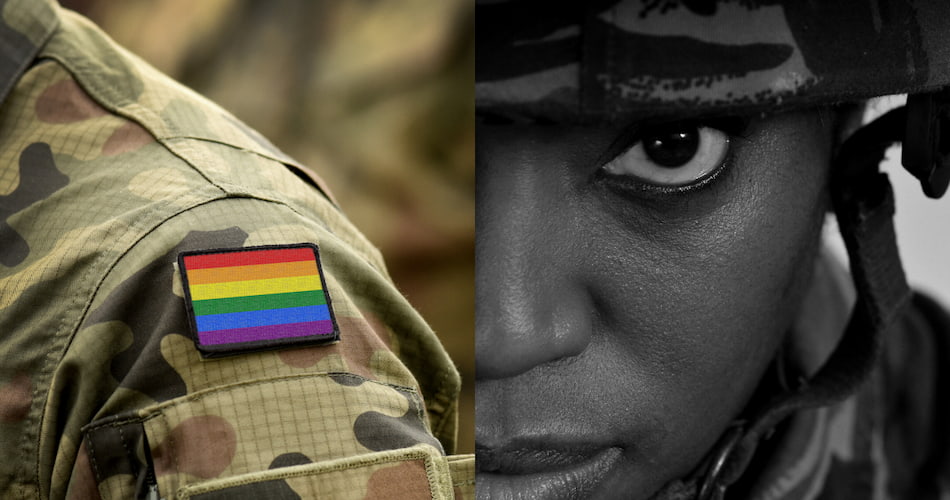This guest post introduces the doctoral research project of Evan R. Seamone, a student in Northeastern’s Doctor of Law and Policy program, titled, Stigma-in-Arms: A Quantitative, “Big Data” Examination of how VA Judges Decide Disability Claims for the Impact of Sexual-Orientation and Race Discrimination During Military Service, scheduled for completion and defense in mid-2020.
When Words Hurt
Recent headlines abound on the topic of reparations for the intergenerational effects of slavery. While supporters argue that past racism has created present obstacles to success among targeted groups, opponents often disclaim responsibility for the acts of one’s forefathers in prior generations or centuries. Although these conversations are vital to addressing the challenge of race relations, they largely exclude the topic of compensation for wounds from direct discrimination that happened during one’s lifetime. Growing research demonstrates that words of discrimination and prejudice can—and do—hurt, to the point where they transform the physiology of the brain and result in chronic mental illness. Terms like race-based traumatic stress and minority stress are examples of these effects and refer to particular types of discriminatory trauma linked to one’s race or sexual minority status.
Court Cases Reveal Doubts About the Legitimacy of Discriminatory Trauma
In the absence of reparations or other measures to compensate survivors of discrimination, courts appear to provide the answer for determining how and when discriminatory trauma is compensable. Title VII of the Civil Rights Act allows compensation for racial discrimination in federal courts and victims can sue in state courts for discrimination under common law theories of intentional infliction of emotional distress. However, scholars’ studies reveal low success rates in the courts for a variety of reasons, including:
- the belief that nonphysical mental health injuries are not as severe as physical harm;
- suspicion of malingering or exaggeration of mental health symptoms due to the subjectivity of mental health diagnoses; and
- disagreement among mental health experts on how to apply diagnostic standards.
Even when discriminatory acts are undisputed, courts have found the behavior was not outrageous enough to cause serious psychological harm. To date, reported court cases fail to offer a standard framework to navigate these complex issues.
Learn More about Earning a Doctor of Law & Policy
Advance your career and tackle public policy challenges with a multidisciplinary approach.
Veterans’ Benefits Claims Provide New Insights on Discriminatory Trauma
The military is an unexplored context for considering the impact of discrimination. It offers promise because the Department of Veterans Affairs (VA) provides compensation for all injuries caused or aggravated during a veteran’s active service. This standard includes mental health conditions caused by discriminatory acts of fellow military members. Given the military’s history of discriminatory policies, many veterans likely face these mental health consequences. Not only was the military racially segregated until the 1950s, but the military also persecuted, punished, and involuntarily separated lesbian, gay, bisexual, and transgender (LGBT) veterans under an anti-gay policy that was only recently repealed in 2011. These institutional policies condoned and promoted discriminatory acts that were more harmful than the policies in isolation.
Military Race Discrimination
Race discrimination in the military was widespread, even after segregation ended under Executive Order. For example, service members in some towns near military bases still reserved specific bars for one race and enforce norms to punish members of other racers for violating these geographic boundaries.
During the Vietnam War, race riots occurred in bases across the globe, with multi-day battles occurring on Navy ships, cross burnings at Vietnam fire bases, and open display of the Confederate flag and Ku Klux Klan mantras. VA psychologists identified a form of psychological trauma among Asian-American and Pacific Islander veterans who were often compared by Caucasian troops to the Vietcong enemy forces based on their physical characteristics. Further studies of minority veterans of the Vietnam War indicated that they suffered from higher levels of mental health conditions than non-minority veterans, even when accounting for combat experiences. Discrimination is thought to be a major explanation for these health outcomes.
Military Sexual-Orientation Discrimination
While some compare the present Transgender Ban to “Don’t Ask, Don’t Tell”, the military’s longstanding anti-gay policy (which existed in some form from the 1940s to 2011) had very severe consequences. Because same-sex sexual acts were criminalized, military law enforcement and counterintelligence forces conducted criminal investigations under the threat of court-martial and imprisonment. Agents often conducted dragnets in which they would interrogate suspected LGBT service-members for hours or days on end, threatening to tell family members and even hometown newspapers they were gay or lesbian unless they named names of other suspects. Suspects could be kicked out of the military with less-than-honorable discharges that limited their ability to obtain benefits from the VA and official discharge papers bearing the word “homosexual,” which they would be forced to show to potential employers. While 114,000 service members were discharged from the military under the anti-gay policy, many times this number of LGBT veterans served in silence watching the ordeals of peers and sometimes living double lives. Current research reveals that LGBT veterans, like racial minority veterans, have higher rates of mental health conditions than non-LGBT veterans even when accounting for combat experiences.
The Military Environment Amplifies Discriminatory Effects
The military is unique from other jobs based upon the nature of the duties, which require service members to not only sacrifice their lives, but to kill an enemy when necessary. In such an environment, group cohesion and teamwork are essential to one’s success and survival. For veterans who experienced discrimination, many faced the harsh reality that they would not be able to rely on their peers when engaged in battle. This fear could begin in training environments and it could grow worse when the unit traveled to the front lines. Some African-American soldiers were sent on dangerous patrols based on racial motives to protect white peers who remained safe in the rear elements. This concern was not limited to race. In addition to being exposed to anti-gay graffiti prominently displayed on bases, threats, anti-gay chants during running cadences, and beatings, at least one service member was murdered by peers based on suspicions of his sexual orientation.
VA Disability Claims for Racial Discrimination
Veterans have applied for benefits at increasing rates since 2001, with large numbers of Vietnam veterans and Iraq and Afghanistan veterans applying for compensation related to mental health conditions. Initially, non-attorney adjudicators determine eligibility for benefits at one of 57 VA Regional Offices. Those who are denied benefits may appeal to the Board of Veterans Appeals (BVA). BVA judges consider and summarize each veteran’s health records in careful detail, including an examination of medical history and diagnoses before, during, and after military service. They must review the reason for the denial and explain why they have upheld or reversed it with a discussion of the evidence presented by the veteran.
The VA has a large backlog of appellate cases. Congressional oversight has led to programs for tracking and categorizing pending cases, and as of January 2019, the BVA hosted 1.5 million decisions on its decision search database. While the VA does not follow or report on cases involving discrimination, the BVA instituted a quality control system to track the types of cases filed for appeal. A recent Freedom of Information Act request led to the identification of docket numbers for approximately 123,000 appellate decisions addressing the issue of improper denial of disability claims based upon mental health disorders.
Identifying Discriminatory Trauma Cases
A current research project in Northeastern University’s Doctor of Law and Policy (DLP) program is applying machine learning algorithms as a method to cull through the 123,000 decisions to find the ones related to traumatic discrimination. The study builds on the recent application of machine learning in the field of accident surveillance methods to predict the most likely causes of injuries by reviewing hundreds of thousands of workers’ compensation claims and narrative summaries of accident reports. After a team of research assistants identifies known instances of race and sexual-orientation discrimination using string searches and other Natural Language Processing (NLP) techniques, these confirmed traumatic discrimination examples will be used to train algorithms in the Python computer program to find and automatically categorize additional traumatic discrimination cases. The technique will be more sophisticated than legal databases and its results will permit quantitative analysis of traumatic discrimination cases.
Goals for the Study
Correlation and regression analysis will identify whether specific characteristics of identified cases are related to approvals or denials of appeals. The study is expected to reveal important insights on the types of discrimination that are most likely to succeed in appeals, the types of mental health disorders that are most associated with particular forms of discriminatory acts, and the manner in which mental health providers are applying the diagnostic criteria of the Diagnostic and Statistical Manual of Mental Disorders to discriminatory injuries. Ultimately, these results will form the basis for a guide to assist veterans’ advocates in evaluating the chances of success for a given discrimination claim and obtaining the evidence to improve those chances.
About the Author

Evan Seamone is an attorney who specializes in veterans’ benefits. He is a student in Northeastern’s Doctor of Law and Policy program who draws on 17 years of combined active and reserve Army service as a military attorney. While Evan already held both a Juris Doctorate and a Master’s in Public Policy upon entering the DLP program, he believed this advanced degree would help him combine the disciplines and develop his skills in legal policy analysis.
Evan says that the hybrid format of DLP classes, including its cohort method of study, allowed him to participate in the DLP program while working full time as a Staff Attorney at the Veterans Legal Clinic of Harvard Law School. Evan is using the GI Bill Yellow Ribbon program to fund his studies and is grateful for the guidance of his doctoral research committee which includes Professor Carlos Cuevas, a clinical psychologist in Northeastern’s School of Criminology and Criminal Justice, and Professor Libby Adler, a professor at Northeastern University’s School of Law who specializes in administrative law and gender and sexuality studies.
For more information on Northeastern’s Doctor of Law and Policy program, explore our program page or contact an enrollment coach for personalized advice.






Related Articles
Jackney Prioly Joseph on How Her MPA Helped Her Career
Master’s in Nonprofit Management vs. Public Administration
How an MPH Clarified One Alumna’s Career Path